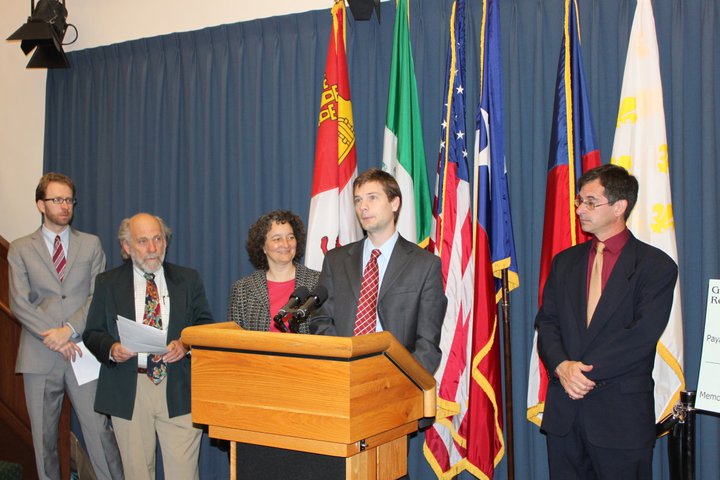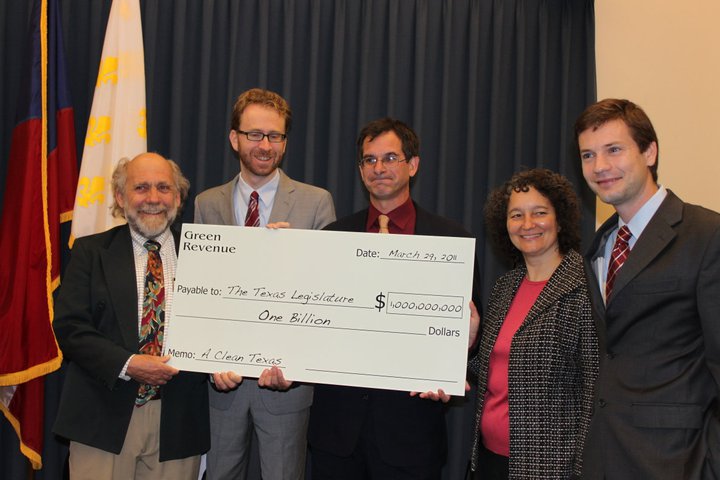UPDATED!!!!
After receiving communications from the office of Senator Carlos Uresti, we realize that there was an inaccuracy in the original form of this post. Senator Uresti has apparently never taken a charter flight from Austin to San Antonio, rather, he has taken flights from Austin to other areas in his sizeable district, and then flew back to San Antonio. We apologize for any misinformation and hope that this clarification sheds further light on the matter.
DOUBLE UPDATED!!!!
According to the Dallas Morning News, Rick Perry was living it up in Vegas, and once again taxpayers picked up the tab for his security detail. The rest of the party was paid for by political donations and private contributions:
They say that what happens in Las Vegas stays there, but for Rick Perry, not all of it has.
The governor’s Oct. 24 political trip to Las Vegas to meet with Brian Sandoval, a Republican candidate for Nevada governor, included a bachelor party for Perry’s son, Griffin, spokesman Mark Miner conceded Thursday.
He initially declined to call it a bachelor’s party, saying he would describe it more as a dinner. He confirmed, though, that it was a celebration of Griffin Perry’s upcoming nuptials joined by a number of his male friends.
…
The governor used a combination of money from his political donors and the Republican Governors Association to pay for his Vegas trip. It’s illegal to use campaign funds for personal travel, but Perry has a history of combining business with pleasure trips so that political entities will pick up the tab.
…Taxpayers do not pay for such travel by the governor or his family, but his security detail is funded by the state. Department of Public Safety officials would not say Wednesday how much that cost.
The Las Vegas meeting with Sandoval might not have been that pressing, as it turned out. The former U.S. district judge and Nevada attorney general came to Austin a little more than three weeks later to attend a Republican Governors Association meeting hosted by Perry.
Perry has been a leader of the RGA, which raises millions of dollars to boost the campaigns of Republican governor candidates.
On the Saturday of the Vegas trip, Perry stayed at the ritzy Palazzo casino and resort where the cheapest rooms go for $239.
Original post:
Texas Representatives, Senators, and other statewide elected officials, both locally and nationally, receive reimbursements for their on-the-job travels. They travel quite frequently to conduct business that benefits their constituents. Or at least that is what we hope they do.
Some representatives take advantage of the tax-payers’ money by choosing to stay in fancy hotels while traveling and use charter or private planes to get to their destination. Several representatives use campaign money and funding from other sources to pay for their trips across the country and around the world. But reports obtained by Texas Watchdog show the details of travel expenses that Senators billed to the state, and the report reveals spending that is, if not unnecessary, definately unnerving in some cases. They report:
A $3,000, seven-day junket in Maui, staying at a resort boasting a spa that “sets a new standard for head-to-toe pampering in paradise.”
Overnight stays at a Ritz-Carlton in New York, a luxury hotel on Manhattan’s waterfront.
Charter plane trips within Texas for as much as $5,100 a pop.
State senators spent taxpayer money on these travel expenses. And they’re all perfectly within the rules regulating Senate travel — rules the senators write themselves.
The bills range from daily stipend claims and car mileage reimbursement to flights and hotel stays for conferences in Chicago, Washington and New Orleans. The expense reports, receipts and bills from Jan. 1, 2008 to May 1, 2009 also reveal the extent to which senators used private and charter planes to get around. Click here to see a searchable database of all the expenses, which was requested under the Texas Public Information Act.
Senator Mario Gallegos from Houston spent tax-payers’ money to pay for a trip to Hawaii for a conference at which he was a presenter. Gallegos brought his wife and son and stayed in a hotel that boasted of their opulance and ability to pamper: a portion of a hotel bill (paid for by private money, not by the state) attests to the fact that someone . Although he did not ask for reimbursements for his family’s travel expenses, he requested the amount of $1,679.58 for the hotel room expenses. The total hotel bill was $1,919.27. This begs the question of whether this was 100% state business or at least partially family outing, and to make matters worse in Gallegos’ case, he was the only legislator attending the conference that traveled and stayed there on the expense of tax payers, while Troy Fraser, Joe Driver, Larry Taylor and Burt Solomons all had the trip paid for by private donations from those putting on the conference as speakers’ honoraria, or used campaign funds.
In addition, some senators use private planes, state planes, and charter planes to conduct business. Texas senators – in large part Senator Robert Duncan, Senator Carlos Uresti and Senator John Carona – spent over $86,000 using these methods to travel over the period of a year and a half.
A spokesperson for Uresti claims that the size of his district and the lack of airline services in specific areas require him to use non-commercial flights (a reasonable explanation). However, Senator Uresti also used charter flights to travel from Austin to other areas in his district and back to San Antonio, and Senator Carona used his private plane to fly between Austin, Dallas, El Paso and Houston. All these cities have frequent commercial flights for a much cheaper reimbursement price than private or charter planes.
The expensive travel arrangements by Texas Elected Officials translate to the national level as well. Texas representatives and senators spend more taxpayer’s money on travel than any other state representatives. The Texas representatives in DC have used $91,000 in past 12 months on travel expenses, including travels to foreign countries. All in all, the whole House spent 7000 days over the period of 9 months on domestic and international travel. The cost of this travel? An estimated total of 9 million dollars.
Governor Rick Perry also billed the tax-payers for thousands of dollars for an August trip to Israel with his wife, friends and public officials.

"Nice hotel, guv'nuh!"
While Governor Perry’s stay at one of the most posh hotels in the world, King David, was covered by the Doheny Global Group, a private donor, (raising eyebrows on its own) he billed the state for the cost of his bodyguards’ stay. And the cost of just the hotel stay for security? $17,000. In addition to the stay, security costs included expenses for the flight, food, and overtime. All in all, the total sum spent on security for this one trip to Israel was over $60,000. While we certainly understand that Israel is not the safest place in the world and see the need for security, taxpayers have the right to come to their own conclusions about the cost/benefit analysis of such a big pricetag.
The rules on reimbursement for travel expenses are pretty loose (and, we should emphasize, are written by the Legislature themselves), but each Senator must provide a legitimate reason for using private or charter planes. These reasons include a time-crunches, a cheaper option than commercial travel expenses, and the lack of commercial flights to their destination. However, since time-crunch is not easily defined, Senators sometimes choose to use charter or private planes to maximize their time efficiency instead of maximizing the utility of taxpayers’ money. Perhaps each Senator’s expenses are not outrageous, but all unnecessary spending adds up over the span of a year. This money can be used in the communities of their constituents, or for local programs.
So why do they get away with this superfluous spending? Most citizens do not look into reports of each Congressman’s travel expenses, but trust them to spend tax payer’s money appropriately. Congressmen admit they hardly ever receive questions from their constituency about travel expenses.
It is understood, of course, that our Representatives and Senators, etc must travel to conduct business and to form diplomatic relations and push policy agendas. The issue at hand is whether they are eschewing nice amenities at their destination and the methods of transportation on the tax payer’s dime. We are by no means saying that our Representatives have to stay at econo motels and take red-eye flights in order to conduct public business. Further muddying the waters are the different standards and methods in place. Some trips are paid for out of personal and campaign funds, but some spend more taxpayers’ money.
By Harrison
###
By promoting cleaner energy, cleaner government, cleaner cars, and cleaner air for all Texans, we hope to provide for a healthy place to live and prosper. We are Public Citizen Texas.
Read Full Post »









